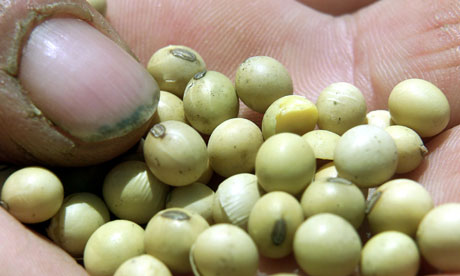The Bill and Melinda Gates Foundation's investments in Monsanto and Cargill have come under heavy criticism. Is it time for the foundation to come clean on its visions for agriculture in developing countries?

A Romanian farmer shows genetically modified soybeans in the village of Varasti. Photograph: Reuters
The Bill and Melinda Gates Foundation, which is sponsoring the Guardian's Global development site is being heavily criticised in Africa and the US for getting into bed not just with notorious GM companyMonsanto, but also with agribusiness commodity giant Cargill.
Trouble began when a US financial website published the foundation's annual investment portfolio, which showed it had bought 500,000 Monsanto shares worth around $23m. This was a substantial increase in the last six months and while it is just small change for Bill and Melinda, it has been enough to let loose their fiercest critics.
Seattle-based Agra Watch - a project of the Community Alliance for Global Justice - was outraged. "Monsanto has a history of blatant disregard for the interests and well being of small farmers around the world… [This] casts serious doubt on the foundation's heavy funding of agricultural development in Africa," it thundered.
But it got worse. South Africa-based watchdog the African Centre for Biosafety then found that the foundation was teaming up with Cargill in a $10m project to "develop the soya value chain" in Mozambique and elsewhere. Who knows what this corporate-speak really means, but in all probability it heralds the big time introduction of GM soya in southern Africa.
The two incidents raise a host of questions for the foundation. Few people doubt that GM has a place in Africa, but is Gates being hopelessly naïve by backing two of the world's most aggressive agri-giants? There is, after all, genuine concern at governmental and community level that the United State's model of extensive hi-tech farming is inappropriate for most of Africa and should not be foist on the poorest farmers in the name of "feeding the world".
The fact is that Cargill is a faceless agri-giant that controls most of the world's food commodities and Monsanto has been blundering around poor Asian countries for a decade giving itself and the US a lousy name for corporate bullying. Does Gates know it is in danger of being caught up in their reputations, or does the foundation actually share their corporate vision of farming and intend to work with them more in future?
The foundation has never been upfront about its vision for agriculture in the world's poorest countries, nor the role of controversial technologies like GM. But perhaps it could start the debate here?
In the meantime, it could tell us how many of its senior agricultural staff used to work for Monsanto or Cargill?
No comments:
Post a Comment